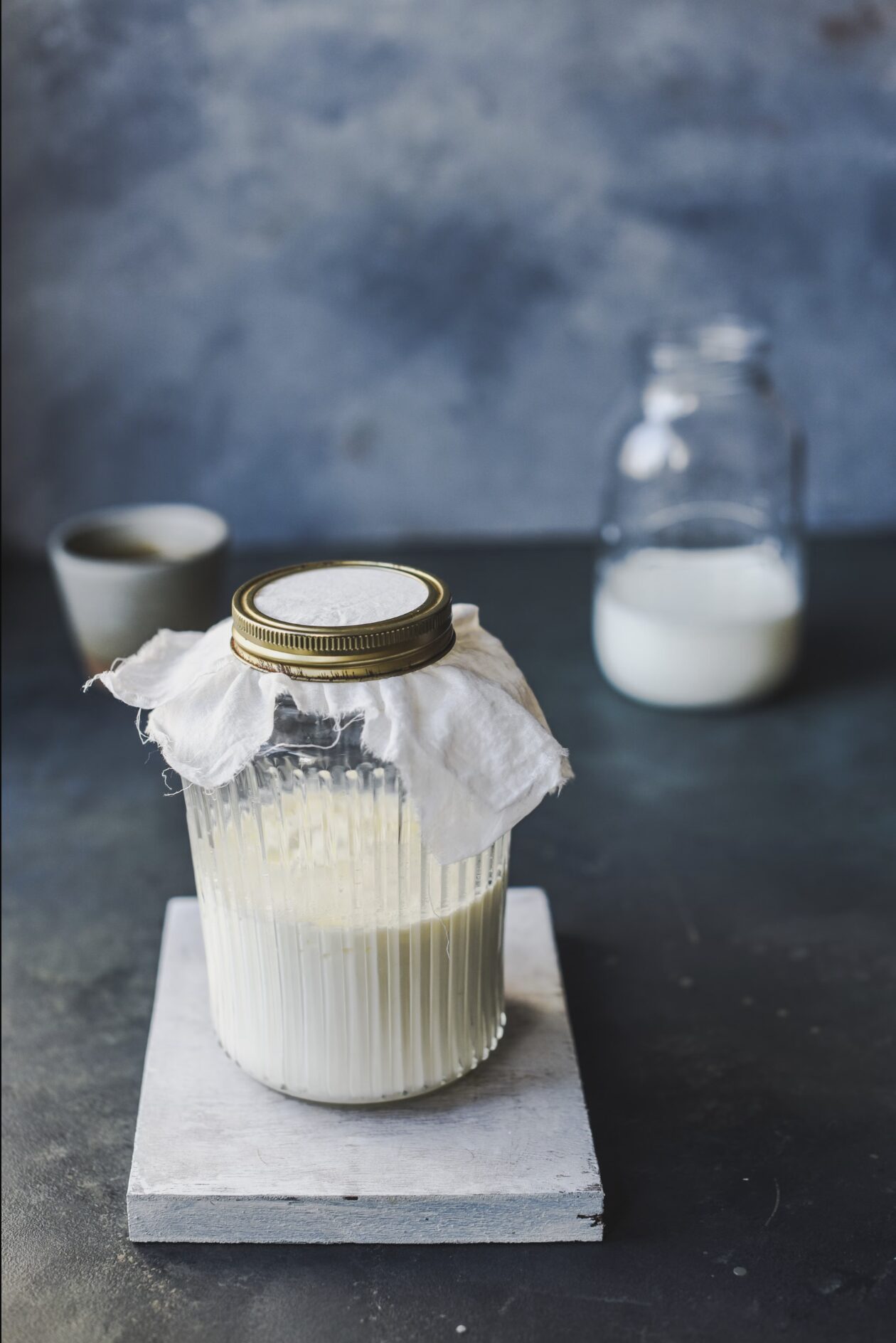Kefir, a fermented milk beverage with ancient roots, has gained popularity in recent years due to its impressive probiotic content and potential health benefits. This article will explore the fascinating history of kefir, its production process, probiotic composition, and the scientific evidence supporting its effects on gut health, inflammation, and longevity.
What is Kefir?
Kefir is a fermented milk drink originating from the Caucasus Mountains region. It is made by adding kefir grains, which are a symbiotic culture of bacteria and yeast (SCOBY), to milk. The fermentation process typically takes 24-48 hours at room temperature, resulting in a tangy, slightly effervescent beverage rich in probiotics[1].
The History of Kefir
The origins of kefir can be traced back to the North Caucasus region, between Russia and Georgia. Legend has it that the Prophet Mohammed bestowed kefir grains, known as the “Grains of the Prophet,” to the Orthodox people and taught them how to make kefir. For centuries, kefir grains were closely guarded by the Caucasian people, who believed they would lose their strength if shared[7].
Traditionally, kefir was made in leather bags, often from animal hides, which were hung near doorways. Passersby would knock or prod the bags to mix the contents, ensuring continuous fermentation. This method of production gave rise to the name “kefir,” which is derived from the Turkish word “keyif,” meaning “feeling good”[7].
Making Kefir at Home
Making kefir at home is a simple process:
- Add 2 tablespoons of kefir grains to 2 cups of milk in a clean jar.
- Cover the jar with a breathable lid (like a coffee filter or cloth) secured with a rubber band.
- Let the mixture ferment at room temperature for 24-36 hours.
- Strain out the kefir grains and refrigerate the finished kefir[1].
Probiotic Content: Kefir vs. Store-Bought Products and Supplements
Kefir is a probiotic powerhouse, containing a diverse array of beneficial microorganisms. Studies have shown that kefir can contain up to 61 different strains of bacteria and yeasts[4]. Some of the most common probiotic strains found in kefir include:
- Lactobacillus species (L. kefiranofaciens, L. kefiri, L. acidophilus)
- Lactococcus species
- Streptococcus thermophilus
- Bifidobacterium species
- Saccharomyces cerevisiae (a beneficial yeast)[4]
The probiotic content of kefir is impressive, with estimates ranging from 10^7 to 10^9 CFU/mL (colony-forming units per milliliter). To put this into perspective, a typical cup of homemade kefir (about 240 mL) could contain anywhere from 2.4 trillion to 24 trillion CFU of probiotics. This is significantly higher than most store-bought probiotic supplements, which often contain only 1-50 billion CFU per serving[6].
Health Benefits of Kefir
Gut Health
Kefir’s high probiotic content can help maintain a healthy gut microbiome. Studies have shown that regular kefir consumption may:
- Improve digestion and reduce symptoms of lactose intolerance
- Alleviate symptoms of inflammatory bowel disease
- Combat harmful bacteria like E. coli and Salmonella[3]
Inflammation and Immunity
Kefir has demonstrated anti-inflammatory and immunomodulatory effects in several studies:
- Kefir consumption has been associated with reduced markers of inflammation in both animal and human studies.
- Regular kefir intake may enhance immune function by increasing the production of immunoglobulin A (IgA) and activating macrophages[3].
Longevity and Overall Health
While direct evidence linking kefir consumption to increased longevity is limited, several studies suggest potential benefits:
- Kefir may help manage metabolic disorders like diabetes and obesity.
- Regular consumption has been associated with improved bone health due to its high calcium and vitamin K2 content.
- Some studies suggest kefir may have anti-cancer properties, though more research is needed in this area[3].
Water Kefir vs. Milk Kefir
While milk kefir is more common, water kefir is an alternative for those avoiding dairy. Water kefir is made by fermenting sugar water with water kefir grains, which are distinct from milk kefir grains.
Both types of kefir offer probiotic benefits, but their microbial compositions differ:
- Milk kefir tends to have a higher diversity of probiotic strains, particularly lactic acid bacteria.
- Water kefir often contains more yeasts and acetic acid bacteria[8].
Both varieties have shown potential benefits for gut health and immunity, though more research has been conducted on milk kefir[8].
Cost Comparison
Homemade kefir is significantly more cost-effective than store-bought versions or probiotic supplements. The cost of homemade kefir is essentially just the price of milk, as kefir grains can be reused indefinitely with proper care. Estimates suggest that homemade kefir costs around $0.02 per ounce, compared to $0.08-$0.10 per ounce for store-bought kefir[5].
Conclusion
Kefir, with its rich history and impressive probiotic content, offers a natural and cost-effective way to support gut health, reduce inflammation, and potentially promote longevity. While more research is needed to fully understand its long-term effects, the current evidence suggests that incorporating kefir into your diet could be a simple yet powerful step towards improved overall health.
Remember, while kefir is generally safe for most people, it’s always best to consult with a healthcare professional before making significant changes to your diet, especially if you have existing health conditions or are taking medications.
Sources [1] Kefir and Its Biological Activities – PMC – PubMed Central https://pmc.ncbi.nlm.nih.gov/articles/PMC8226494/ [2] The Fascinating Origins of Milk Kefir Grains | Revolution Fermentation https://revolutionfermentation.com/en/blogs/milk-kefir/the-fascinating-origins-of-kefir-grains/ [3] How to Make Milk Kefir – Farmhouse on Boone https://www.farmhouseonboone.com/how-to-make-milk-kefir/ [4] The Truth About Milk Kefir VS Probiotic Supplements https://www.thegrainfactory-sg.com/blogs/news/truth-about-milk-kefir-vs-probiotic-supplements [5] Same Same but Different: Water Kefir v. Dairy Kefir – Agua De Madre https://aguademadre.co.uk/blogs/research/same-same-but-different-water-kefir-v-dairy-kefir [6] 9 Evidence-Based Health Benefits of Kefir – Healthline https://www.healthline.com/nutrition/9-health-benefits-of-kefir [7] Milk Kefir History – Yemoos Nourishing Cultures https://www.yemoos.com/pages/milk-kefir-history [8] How to Make Kefir – Two Peas & Their Pod https://www.twopeasandtheirpod.com/how-to-make-kefir/ [9] Commercial Milk Kefir vs Home | Yemoos Nourishing Cultures https://www.yemoos.com/pages/commercial-milk-kefir-vs-home [10] The Many Faces of Kefir Fermented Dairy Products – PubMed Central https://pmc.ncbi.nlm.nih.gov/articles/PMC7071183/

Leave a Reply